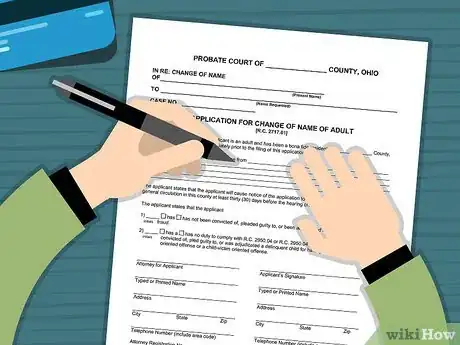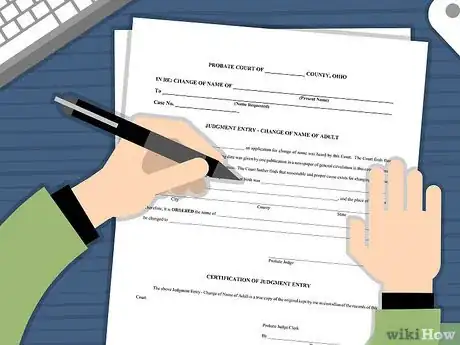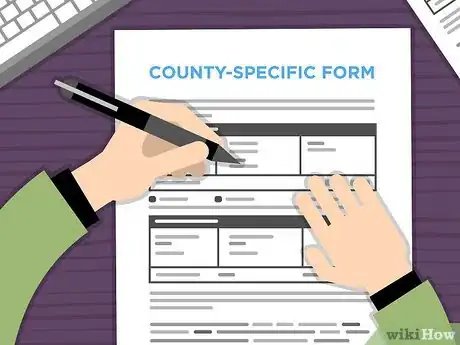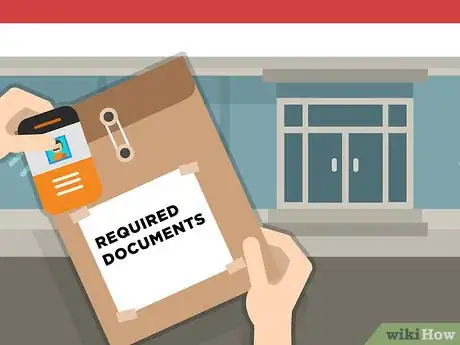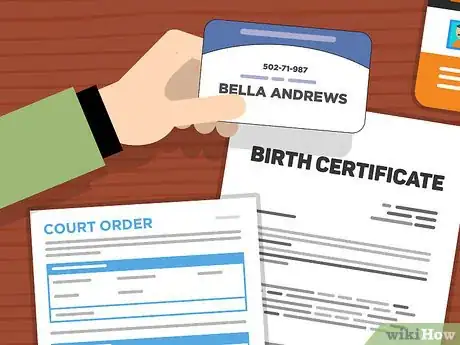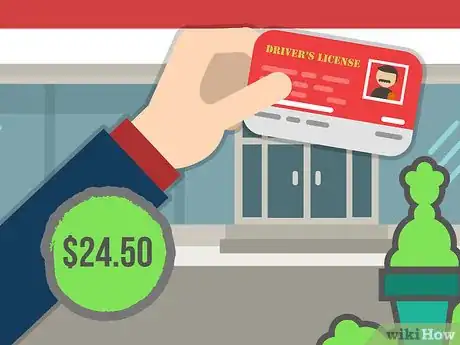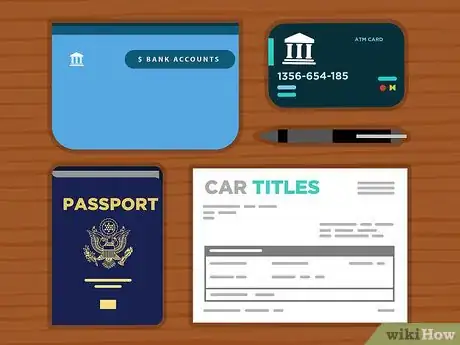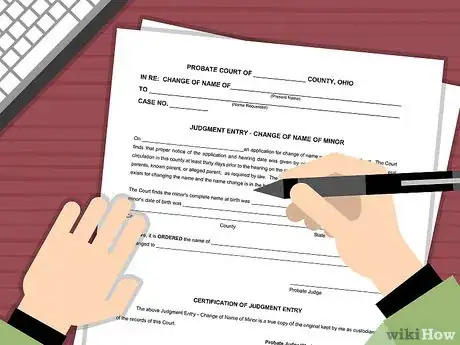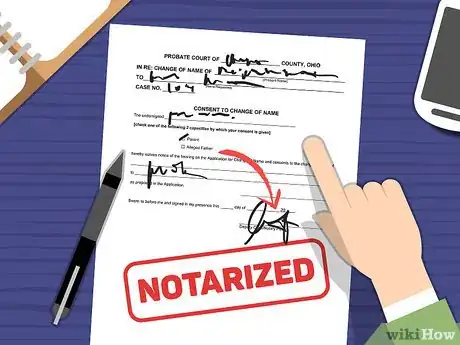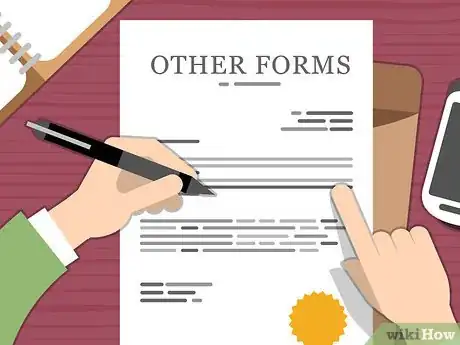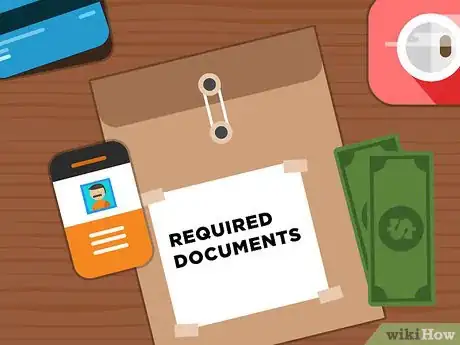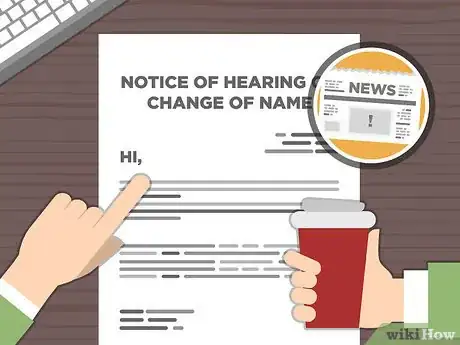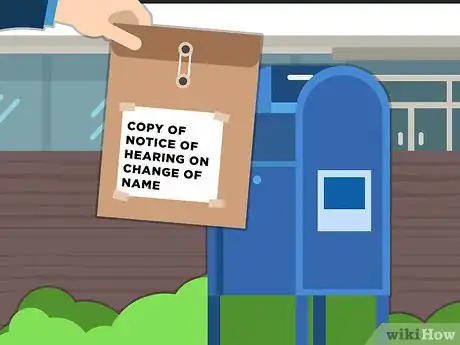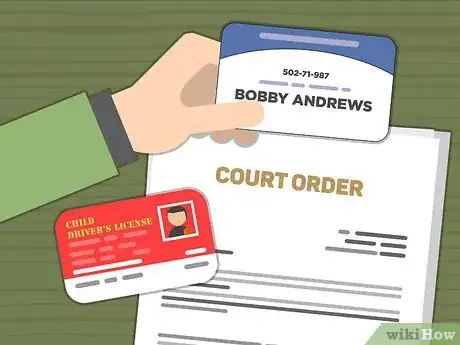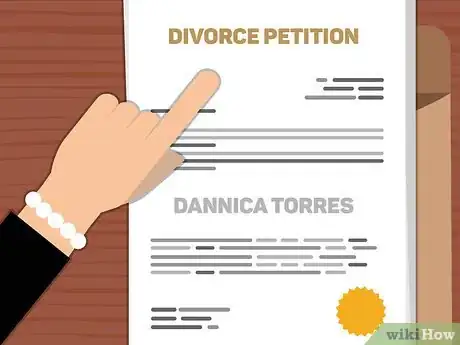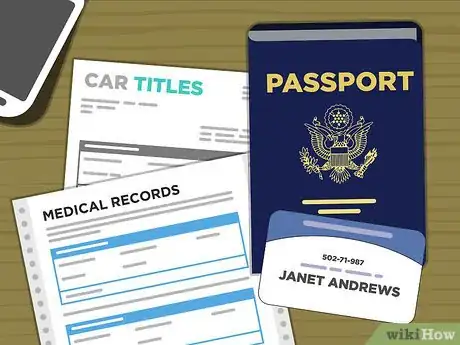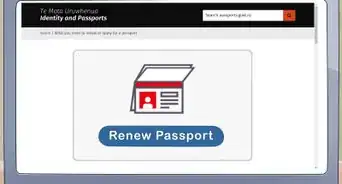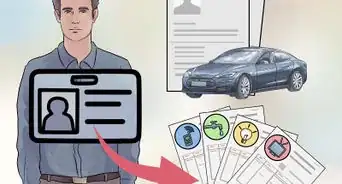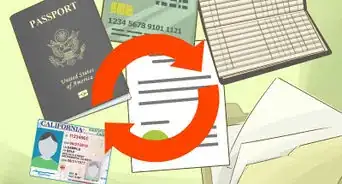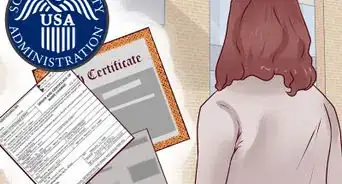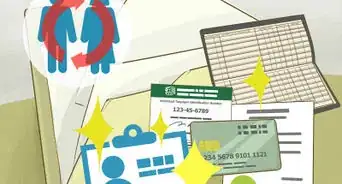This article was co-authored by Clinton M. Sandvick, JD, PhD. Clinton M. Sandvick worked as a civil litigator in California for over 7 years. He received his JD from the University of Wisconsin-Madison in 1998 and his PhD in American History from the University of Oregon in 2013.
There are 16 references cited in this article, which can be found at the bottom of the page.
wikiHow marks an article as reader-approved once it receives enough positive feedback. In this case, 86% of readers who voted found the article helpful, earning it our reader-approved status.
This article has been viewed 89,780 times.
In the State of Ohio, you can change your name for almost any reason. Changing your name at the time of your marriage or divorce is relatively easy. You can also change your name (or the name of a minor child) for other reasons by following a different process. With both methods, you will need to fill out the proper paperwork, get a new Social Security card, and change your name on all of your accounts.
Steps
Applying For A Name Change
-
1Meet the residency requirement. To change your name in Ohio, you must have been a resident of the county in which you will file your Application for Change of Name for at least 1 year.[1]
-
2Choose your new name carefully. Legally changing your name is a serious decision, so you should make sure that you choose a name that you like enough to keep. Before beginning the process of changing your name, practice signing it, and have a few people close to you call you by that name to make sure you like it.Advertisement
-
3Make sure your new name will be legal. You will not be able to change your name if your new name would imply "fraudulent intent" (i.e. that you are not trying to gain some benefit by misleading others about your identity).[2] There are, however, several other reasons why you might be denied a name change, including any of the following:[3]
- You are avoiding bankruptcy by pretending to be someone else.
- Your new name violates a trademark (e.g. changing your name to "Chuck E. Cheese" or "Adidas Batman").
- The name uses numbers or symbols (except Roman numerals).
- The name includes obscene words.
- If you are having trouble determining if your name change is legal, or need legal assistance with this process, hire an attorney. Legal self-help centers may also available to help with name changes, and legal fees may be waived if you demonstrate sufficient financial need. Search online to see what legal aid resources are available in your community.
-
4Complete an Application for Change of Name of Adult. To get a court order officially changing your name, you must fill out a formal request, called an Application for Change of Name of Adult. Different counties in Ohio use their own versions of this form, which are available at the county's probate court or through the probate court's website. The Supreme Court of Ohio provides a standard Application, which you can download here. You can find links to different probate court divisions in Ohio here.
- Leave the case number blank. You will not be issued a case number until you file your forms with the court clerk.
-
5Complete a Judgment Entry form. This is a "proposed order," which you must fill out and submit with your paperwork. If the judge grants your Application, he or she will sign and date the Judgment Entry. Different counties in Ohio use their own versions of this form, but the Supreme Court of Ohio provides a standard form, which you can download here. Do not sign and date the form yourself. That space is for the judge to fill.
-
6Complete any additional county-specific forms. As each county in Ohio has its own forms and requirements for changing your name, you may need to fill out additional forms. Consult your court's website or ask the court clerk about any additional required forms.
-
7File your documents. Bring your documents to the court clerk's office at the courthouse. The clerk will stamp your documents, issue a case number, and give you a hearing date.
- The clerk will ask you to pay a filing fee. Fees vary by county. For example, the fee is $142 in Montgomery County and $128 in Franklin County.[4]
- Bring a valid photographic identification to show the clerk.
-
8Fill out and publish a Notice of Hearing on Change of Name. Ohio courts generally require those applying for name changes to publish a notice of the hearing in a county newspaper.[5] This ensures that potential creditors and other interested parties have a chance to object to the Application. Each county has its own forms, but the Supreme Court of Ohio provides a standard form, which you can download here. Fill out the form, then contact your county newspaper and ask how to get your Notice published. You will be responsible for any fee associated with the publication of your Notice.
- Your Notice must appear in the newspaper at least 30 days prior to your court date.
- Keep a copy of the newspaper in case the judge asks for proof that you published your Notice.
- You may be required to file your completed Notice of Hearing on Change of Name form. Ask the clerk about your county's policy.
-
9Attend your hearing. The clerk will instruct you to appear in court at a later date. The judge will ask you about your reasons for changing your name to make sure that your new name is not fraudulent or misleading.[6] Answer the judge's questions clearly and honestly.
- If your application is denied, get a copy of the denial order and try again.
- If the judge approves your request, you will be granted a name change court order.
-
10Change your name on your Social Security card. Once you have received a court order changing your name, your next step will be to obtain a new Social Security card, which will require you to fill out a form and either deliver it to a Social Security Administration office or mail it in with the required documents.[7]
- Download and complete the application for a new Social Security card, available online.
- Gather your paperwork together. You will need your court order, birth certificate, photo ID (driver's license, passport, or state ID card) and a completed application for a new Social Security card.[8]
- Submit your documents to the Social Security Administration. You can make an appointment to change your name in person, or you can mail in the appropriate documents. All original copies will be mailed back to you with a receipt.[9]
- You can find the address for the Social Security office nearest you via a locator on the Social Security Administration website.[10]
- Your new card should arrive within 10 business days from the date on your receipt.[11]
-
11Change your name on your driver's license or state ID card. Visit your local BMV with your Social Security card and court order to receive a new license. You will have to pay a $24.50 to have a new license printed.
-
12Change your name on all your other documentation. Here is a short list of what you might consider:[12]
- Bank accounts
- Credit cards
- Leases or mortgages
- Car title
- Voter registration
- Medical offices
- Post office boxes
- Passport
Applying to Change the Name of a Minor Child
-
1Meet the residency requirement. A minor must have been a resident of the county in which the application is filed for one year prior to the filing of the application.[13]
-
2Choose a new name for the child. Common reasons for changing a minor child's name include marriage, partnership, or divorce of the parents, and adoption. A child's name can be changed for other reasons as well.
-
3Complete an Application for Change of Name of Minor. The process for changing the name of a minor child is substantially the same as applying for a name change as an adult. Each county uses its own forms, but the Supreme Court of Ohio provides a standard Application, which you can download here.
-
4Complete a Judgment Entry form. If the judge grants your Application, he or she will sign and date the Judgment form. Each county uses different forms, but the Supreme Court of Ohio provides a standard form, which you can download here. Do not sign and date the form yourself. That space is for the judge to fill.
-
5Fill out a Consent to Change of Name and have it signed and notarized. This form must be signed by any parent who is not submitting the application. By signing, that parent gives his or her consent to the name change and waives his or her right to receive notice of the hearing. If the parent does not sign, then you or the court clerk will need to send a notice of the hearing to the other parent. Each county uses different forms, but the Supreme Court of Ohio provides a standard form, which you can download here. The form must be signed by the parent in the presence of a court clerk or notary public, who will also sign the form. The parent should bring a valid form of identification to verify his or her identity for the clerk or notary.
-
1
- You can also find a notary public by visiting your local bank. Most banks do not charge a fee for notary services if you are a bank customer. If you are not a bank customer, you can use the bank's notary service for a small fee.
-
2Complete any additional county-specific forms. As each county in Ohio has its own forms and requirements for changing a minor's name, you may need to fill out additional forms. Consult your court's website or ask the court clerk about any additional required forms.
- Other forms may include a Name Change Supplemental Affidavit, an Affidavit for Unknown Address of a Parent, a Notice to Parent, and/or a Certification of Judgment Entry.[14]
-
3File your documents. Bring your documents to the court clerk's office at the courthouse. The clerk will stamp your documents, issue a case number, and give you a hearing date. Bring a valid photographic identification. The clerk will ask you to pay a filing fee.
- You may also be required to present a certified copy of the minor's birth certificate.[15]
-
4Fill out and publish a Notice of Hearing on Change of Name. Ohio courts generally require that notice of an application to change the name of a minor be published in a county newspaper.[16] Each county has its own forms, but the Supreme Court of Ohio provides a standard form, which you can download here. Fill out the form, then contact your county newspaper and ask how to get your Notice published. The Notice must appear in the newspaper at least 30 days prior to your court date. Keep a copy of the newspaper in case the judge asks for proof that you published the Notice.
- You may be required to file your completed Notice of Hearing on Change of Name form. Ask the clerk about your county's policy.
-
5Give notice to an absent or non-cooperating parent. If one parent is not available (the parent's location is unknown, or he or she does not consent to the child's name change), the parent is entitled to receive notice of the hearing. In some counties, the court clerk will mail a notice to the parent.[17] Other counties will require you to give notice. To give notice, send a copy completed copy of the Notice of Hearing on Change of Name via certified mail to the parent's last known address. Keep the green return receipt card to prove that the notice was sent.[18]
- The parent will have an opportunity to object to the name change at the hearing.
-
6Change the minor child's name on other documents. Change the child's name on Social Security cards, driver's licenses, bank accounts, medical records, passports, and others, as applicable.
- To get a new Social Security card, locate your local office here. Mail this application or deliver it in person, along with the court order, birth certificate, and photo ID.
- To change the name on the child's driver's license, visit your local BMV with the new Social Security card, court order, and old driver's license. There is a $24.50 fee to have a new license printed.
Changing Your Name During Marriage or Divorce
-
1Choose a new name for yourself. Upon marriage or entering into a domestic partnership, you might choose to keep your last name the same, take the last name of your partner, hyphenate your names, make your old last name your middle name, or some other combination that fits your family.[19] Similarly, upon divorce or ending a partnership, you may wish to change your name back to what it was before.
- This method may only permit you to change your middle and/or last name to the last name of either spouse, or combine your last names. If you would like to change your middle or last name to something else, or to change your first name, you may need to file an Application for Change of Name.
-
2List your new name on your marriage certificate or divorce petition. When you go to the courthouse to get your marriage certificate, the clerk should ask you if you would like to change your name. Make sure your full new name is listed on the marriage certificate.[20] Similarly, you can request that the court change your name back to your prior name in your divorce paperwork.
- If you have already obtained your marriage certificate and it does not include your name change, you will need to use the court system to change your name.
-
3Change your name on other documents. Change your name on your Social Security card, driver's license, bank accounts, medical records, passport, leases, car title, and others, as applicable.
- To get a new Social Security card, locate your local office here. Mail this application or deliver it in person, along with the court order, birth certificate, and photo ID.
- To change the name on your driver's license, visit your local BMV with your new Social Security card, old driver's license, court order, and proof of residency (such as a utility bill or a postmarked letter with your name and current address. You are required to notify the BMV of your change within 10 days of the date of the court order changing your name.[21]
Warnings
- This article is intended as legal information and does not provide legal advice. If you need legal advice, contact a licensed attorney.⧼thumbs_response⧽
- Keep your old identification, just in case.⧼thumbs_response⧽
References
- ↑ http://www.supremecourt.ohio.gov/LegalResources/Rules/superintendence/probate_forms/nameChange/21_0.pdf
- ↑ http://definitions.uslegal.com/f/fraudulent-intent/
- ↑ http://family.findlaw.com/marriage/how-to-legally-change-your-name.html
- ↑ www.mcohio.org/government/probate/docs/WEBCOPYPUBLIC_FEE_GUIDELINE11_3_14.pdf
- ↑ http://info.legalzoom.com/legally-change-name-ohio-20195.html
- ↑ http://info.legalzoom.com/name-change-hearing-consist-civil-court-26296.html
- ↑ https://www.theknot.com/content/name-change-101
- ↑ http://www.ssa.gov/online/ss-5.pdf
- ↑ http://www.ssa.gov/forms/ss-5.pdf
- ↑ https://secure.ssa.gov/ICON/main.jsp
- ↑ https://faq.ssa.gov/en-US/Topic/article/KA-02196
- ↑ http://family.findlaw.com/marriage/how-to-legally-change-your-name.html
- ↑ http://www.probatect.org/services/instructions/html/minorNameChange.html
- ↑ http://info.legalzoom.com/change-minors-last-name-ohio-20543.html
- ↑ http://info.legalzoom.com/change-minors-last-name-ohio-20543.html
- ↑ http://info.legalzoom.com/change-minors-last-name-ohio-20543.html
- ↑ http://info.legalzoom.com/change-minors-last-name-ohio-20543.html
- ↑ http://www.probatect.org/services/instructions/html/minorNameChange.html
- ↑ http://www.kiplinger.com/article/credit/T065-C006-S001-5-choices-for-changing-your-name-after-marriage.html
- ↑ https://www.theknot.com/content/name-change-101
- ↑ http://transportation.ky.gov/Driver-Licensing/Pages/Driver-License-ID-Card-General-Information.aspx



